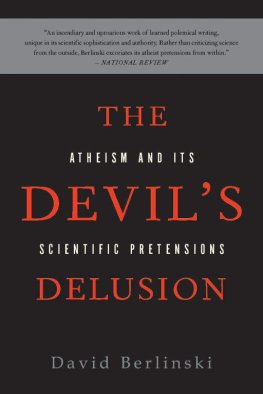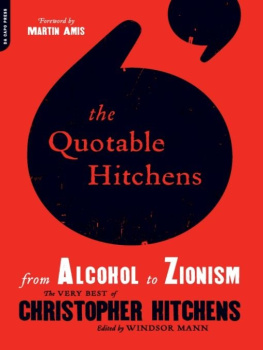Hitchens - The Cameron Delusion
Here you can read online Hitchens - The Cameron Delusion full text of the book (entire story) in english for free. Download pdf and epub, get meaning, cover and reviews about this ebook. City: Great Britain, year: 2018;2010, publisher: Bloomsbury Academic, genre: Politics. Description of the work, (preface) as well as reviews are available. Best literature library LitArk.com created for fans of good reading and offers a wide selection of genres:
Romance novel
Science fiction
Adventure
Detective
Science
History
Home and family
Prose
Art
Politics
Computer
Non-fiction
Religion
Business
Children
Humor
Choose a favorite category and find really read worthwhile books. Enjoy immersion in the world of imagination, feel the emotions of the characters or learn something new for yourself, make an fascinating discovery.

The Cameron Delusion: summary, description and annotation
We offer to read an annotation, description, summary or preface (depends on what the author of the book "The Cameron Delusion" wrote himself). If you haven't found the necessary information about the book — write in the comments, we will try to find it.
The Cameron Delusion — read online for free the complete book (whole text) full work
Below is the text of the book, divided by pages. System saving the place of the last page read, allows you to conveniently read the book "The Cameron Delusion" online for free, without having to search again every time where you left off. Put a bookmark, and you can go to the page where you finished reading at any time.
Font size:
Interval:
Bookmark:

The Lost Frontier
The creatures outside looked from pig to man, and from man to pig, and from pig to man again; but already it was impossible to say which was which.
George Orwell, Animal Farm
Conventional wisdom is almost always wrong. By the time it has become conventional, it has ceased to be wisdom and become cant. Its smug cousin, received opinion, is just as bad. This is not really opinion at all, but the safe adoption of whatever is modish and popular. The aim of this book is to defy these two enemies of thought and reason. They are powerful in our conformist media, and our conformist media are powerful in the state, persuading millions to think that the ideas and beliefs of others are their own, engineering consent to chosen schemes, denying that consent to ideas they do not favour.
Conventional Wisdoms biggest single mistake is its thought-free, obsolete idea of Left and Right. This still relies on categories and symbols which were dead long ago, and only kept from decomposing by the refrigeration of the Cold War: capital versus labour, state control versus free enterprise, NATO versus the Warsaw Pact, democracy versus Communism, the stuffy censoring establishment versus the vibrant, unconventional radical fringe. These deserted battlefields have little to do with the real divisions which now exist between idealist, optimistic progressives and anti-utopian, pessimistic conservatives. Capital and organised labour combine against small business to favour regulation and globalism. Trades Unions long ago abandoned shop-floor struggles, and now mainly act as lobbies for more spending on the public sector where most of their members now work. They also range themselves with multinational corporations in campaigns for globalist and regulatory policies. The NATO alliance symbolises this survival of outward forms, despite the shrivelling away of the conflict that originally created them. The North Atlantic Treaty Organization, bizarrely, continues to exist despite the complete disappearance of the Soviet opponent it was formed to deter.
When Russia recently threatened Georgia, battalions of commentators and politicians in what is still, for lack of a better term, called The West behaved as if this squalid and unimportant territorial squabble between unlovable governments was comparable to the Soviet invasion of Czechoslovakia forty years before. Yet it was wholly different. Russia is no longer an ideological state, externally or internally. It no longer seeks global power, and in some ways is less interested in the minds of its citizens than are Western countries which demand increasing obedience to the formulas of political correctness. In Russia, you may hold what private opinions you like. Just do not challenge the state. In Britain, your private opinions may be reported to the authorities and get you into trouble, even if you believe your actions are part of normal life and you have no wish to challenge the state. This paradox is one of the most alarming facts about the modern world, and is unfortunately too little understood. This is partly because of the growing conventional wisdom that a New Cold War is taking place between tyrannical Russia and free Britain. This is untrue and pernicious. The invented threat abroad is used to justify a stronger state at home.
No doubt the need to preserve its plump apparatus on the outskirts of Brussels partly explains NATOs unresting search for a new enemy, which began in the ruins of Yugoslavia and has now taken it to Afghanistan, about as far from the North Atlantic as it is possible to get. But there is something more. Once a tersely effective and single-minded body, it has become, wordy, utopian and ineffectual the military arm of the new interventionist idealism. Here as everywhere else in the formerly anti-Marxist West, the supposedly beaten Left have become the establishment. The Left and their utopian ideas dominate the civil service, the arts, broadcasting, the academy, the bench of bishops, the courts and the police.
They now censor (and censure) speech and thought, through the formulas of political correctness. They place narrower limits on the speech and writing of others than the Lord Chamberlain ever did on the London stage. At the same time they dispense with any rules that might get in their own way. A liberal will defend to the death your right to agree with her. Disagree with her, and she will call the police.
The defence of literary merit now excuses almost all things which were once taboo, so that Last Exit to Brooklyn, once thought grossly disturbing, is tame to the point of dullness by comparison with the general culture. The Little Red Schoolbook, once thought too revolting for children, was long ago eclipsed by tax-funded sex education schemes presented to six-year-olds by respectable pedagogues. Some of the schoolkids issue of Oz magazine still has the power to disgust those who exhume it from the archives, especially the obscene version of a Rupert cartoon with its deliberate dirtying of an innocent childhood character. But nobody could be prosecuted now merely for disgusting anyone. The wife of a former prime minister publicly discusses the conception of her youngest child thanks to the lack of contraceptive equipment during a stay at Balmoral. Sexual intercourse is frequently portrayed on mainstream TV channels. In this new mix of licence and censorship, there are new taboos, strange paradoxes and odd reversals. It is a joke to call an airline Virgin, but close to an insult to describe an adult as one. The expression bastard can be used freely with one exception. It may not be used as an epithet for a child born out of wedlock. The f-word has become mere punctuation and the failed comedians standby, while the n-word is (rightly in my view) unsayable by a white person. Those who would once have been the targets of such expressions have special licences to use them, which is strange but defensible. A homosexual can refer to himself as queer and a black person can use the term n*****. But nobody else can. This can be taken to absurd lengths, and is. An employee of the District of Columbia, David Howard, was forced to resign from his post in January 1999 after innocently using the word niggardly a word which has no racial connotations and certainly had none when he used it. He was eventually rehired by Mayor Anthony Williams, who had at first accepted his resignation. It is perfectly possible to imagine a similar incident in a British town hall or police station.
The sayings and writings of conservative thinkers, and the actions of conservative institutions, are scanned by heresy hunters for evidence of bigotry, and where none is found they are generally accused of it anyway. The charge of institutional racism, made against the Metropolitan Police by the Macpherson report into the Stephen Lawrence murder investigation, followed the reports failure to identify any instance of actual racial discrimination. The MP and former army officer Patrick Mercer, a man demonstrably free of racial bigotry, was abruptly fired from the Tory front bench for making a factual statement about the use of racial epithets in the army.
Thanks to this, the defence of dangerous radicalism, the breach of official speech codes, the defiance of cultural norms and moral challenges are left to conservatives and to the old-fashioned type of Christian, who is occasionally questioned by the police for going too far (see the cases of Harry Hammond, Lynette Burrows, Joe and Helen Roberts, and ). Sufferers from this failing are inferior persons not entitled to any consideration in public debate, and automatically in the wrong. Interestingly, the same people are often accused (and convicted without trial) of Islamophobia, another unacceptable failing. The paradox, that Islam is (by the same definition) homophobic is often left unexplored.
Font size:
Interval:
Bookmark:
Similar books «The Cameron Delusion»
Look at similar books to The Cameron Delusion. We have selected literature similar in name and meaning in the hope of providing readers with more options to find new, interesting, not yet read works.
Discussion, reviews of the book The Cameron Delusion and just readers' own opinions. Leave your comments, write what you think about the work, its meaning or the main characters. Specify what exactly you liked and what you didn't like, and why you think so.














